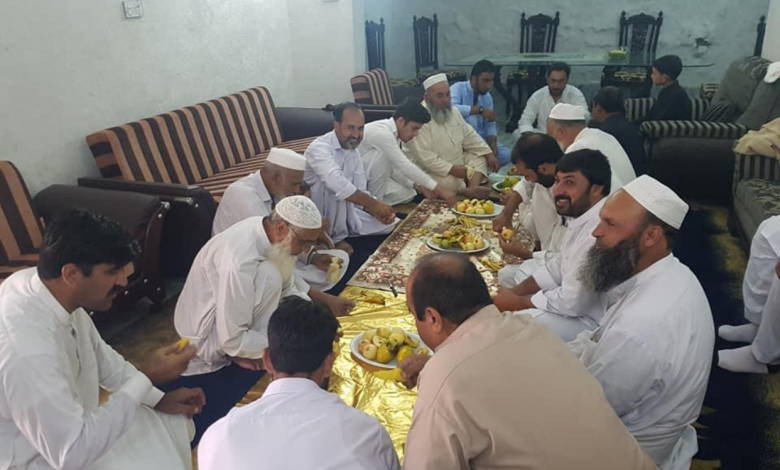Pashtuns & Hospitality:

By Qasim Swati (United Kingdom)
Being one of the main components of Pashtunwali (a set of values, customs and cultural code for regulating the Pashtun society), hospitality still plays a significant role in reviving, flourishing, uplifting and maintaining the traditional lifestyle of the Pashtun people. Despite having overwhelming influence and control of materialism, robotic lifestyle and workaholism over today’s way of life, the majority of the Pashtuns strictly practise hospitality even these days. Thus, hospitality is still widely observed by many of the Pashtun people in the Pashtunistan regions of Afghanistan, Northern Balochistan, Khyber Pakhtunkhwa and some of the Pashtun communities all over the globe.
The Pashtun people are proud of and renowned for their tradition of hospitality, where they friendly, generously and willingly receive and entertain guests, visitors and even strangers, irrespective of their religious belief or faith, colour, gender, race, nationality, language, age and social, economic, political or other background.
Pashtuns have a great regard, respect and consideration for maintaining their ritual of hospitality, where most of them do their best to honour and entertain their guest (s) as far as possible for them. The hosts care so much for their guests that they might, sometimes, go hungry themselves, if there is not enough food available to be sufficient both for the guests as well as for the hosts in order to supply plenty of food for their guests. Besides entertaining their guests with the best possible dishes and provision of other facilities, this will also be the first priority of the hosts to provide their guests with the most comfortable accommodation ever possible for the hosts to accommodate.
Whether this may be a guest, visitor, stranger or a member of one’s own tribe, the cordial and friendly reception and the appropriate entertainment of such people is the requirement, placed by Pashtunwali on all its tribesmen towards others, known as ‘hospitality’ or ‘Melmastya’, where all the Pashtun people are required and expected to receive, entertain and respect their guests, visitors, or even strangers, regardless of their any background or characteristic, with no hope or expectation of any favour or remuneration from the guests in return.
Hospitality is very highly regarded in the Pashtun society, which is deemed as a symbol of generosity, friendliness, sincerity, compassion, fellow feeling and benevolence in the Pashtun culture. Consequently, hospitable, generous, friendly and welcoming people are respected and valued by the other Pashtuns for the sacrifices that they make, while receiving and entertaining their guests.
On the contrary, inhospitable people are considered, within a Pashutn community, to be mean, unsociable, greedy, selfish, ungenerous, stingy, miserly, parsimonious, close-fisted, penny-pinching, tight and uncongenial, and, thus, being looked down upon by others, instead.
That is because of the significance of hospitality within the Pashtun culture that a Scottish statesman and historian, Mountstuart Elphinstone (1779–1859), observed in 1815: “The most remarkable characteristic of the Afghans (Pashtuns) is their hospitality. The practice of this virtue is so much a point of national honor that their reproach to an inhospitable man is that he has no Pushtunwali.”
Qasim Swati is a freelance journalist, writer and human rights activist, based in the UK, and can be reached at https://qasimswati.com or qasimswati2003@yahoo.co.uk.

